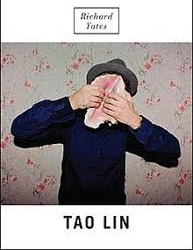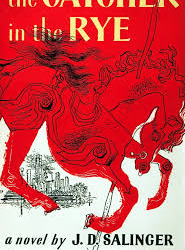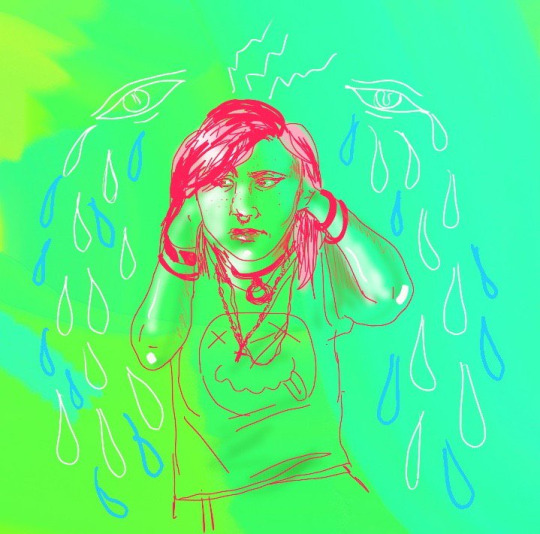Text
Nothing New Under the Sun
Tao Lin’s Richard Yates helps to express some of the effects of the emo characteristics that we have been discussing. Emo is about releasing emotions, but it tends to be one-sided and self-centered. While expressing emotions to other people can be cathartic and help people understand your conflicts, failing to see the bigger picture because you are too focused on your own emotions can result in viewing things incorrectly and venting for the sake of venting without trying to accomplish things to fix it. Richard Yates depicts these issues well within the characters of Haley Joel Osment and Dakota Fanning and their toxic relationship. Their emotions create a self-centered view of the world, and they do nothing to proactively change anything since they only complain about the issues.

Haley Joel Osment has an incredibly controlling personality, constantly making demands of Dakota Fanning, who he is supposed to love. He is constantly demanding that she tell him everything that she has done by the minute. He demands that Dakota mails him daily. He also pressures her to try to figure out if she has lied about anything. Whenever she makes a mistake, he considers her promise to stop to be a lie, and he demands that she change her behavior. While Dakota does make many mistakes and tell many lies, Haley Joel’s attitude is toxic. Conversations with him are better described as interrogations and accusations. He never offers encouragement. He never focuses on the positive changes that she makes. Instead he demands that Dakota becomes the person that he wants her to be. Haley Joel does many things for Dakota, such as giving her money for a ticket, making food for her occasionally, and mailing her things, but he expects her to reciprocate by doing whatever he asks. While Dakota probably should return the favors at some point, that should never be a requirement. It suggests that Haley Joel is simply being nice in order to be rewarded. His self-centered nature causes his good deeds to be revealed as attempts to be repaid in a manner that benefits himself in the end.
Dakota Fanning also displays self-centered behavior. While at first she may seem to simply want to serve Haley Joel Osment, I believe that she simply seeks validation. She constantly talks about how badly she wants to be with Haley Joel and how much better she feels when he is around. She wants someone to comfort her as well as having a boyfriend to give herself validation that since she has a boyfriend, she must be doing something right. At least, that can be a common belief. Despite the fact that it is not true, being in a romantic relationship is sometimes seen as higher status than someone without a romantic partner. She uses her relationship with Haley Joel as well as the rare nice things that he says as a way to validate herself. Otherwise, she might not believe that her life has any purpose or meaning.
More evidence of Dakota’s self-centeredness is the fact that she usually doesn’t change her behavior. She continues to lie, steal, vomit, and anything else that Haley Joel asks her to do. This leads into the fact that if you solely express your emotions, nothing will ever get accomplished. When emo bands sing about their broken relationships, they are not known to attempt to fix them. In a similar way, despite the fact that Dakota writes an apology list that spans four pages of the book and lies about almost everything, she continues to make mistakes that Haley Joel uncovers in his interrogations. Her behavior overall barely changes across the book. In fact, the book as a whole helps to depict this concept. Throughout the entire book, nothing changes. Their relationship doesn’t advance. After major fights, the next paragraph has them as close as before the fight with no consequences. They would be excited to see each other, meet up, get angry, part ways, return to the computer, and talk about how much they can’t wait to see each other again. While various events happen, the story doesn’t grow or develop. Simply looking at the ending explains it all: there isn’t one. Nothing happens. The characters simply part ways as they always have throughout the book. There was a big argument before, but nothing comes of it. Haley Joel just leaves, promising to see Dakota again. Tao Lin could have added several more sections, and no one would question it since the actual ending didn’t feel like an ending. The only reason why I knew it was the end of the book instead of just the end of any other meeting was the fact that there wasn’t any writing on the next page.
This could be intentional due to the fact that emo tends to change nothing. It expresses emotions, and it leads people to understand the singer’s view, but it doesn’t fix the problem by itself. If no action is taken to fix the problem, it will just continue, just like the issues from Nothing Feels Good, where the characters ran to their computers every day since nothing was improving in their real lives. Their lives weren’t improving since they simply ran to their computers to receive validation instead of fixing the root problem. They still had to go to school every day and deal with their problems. They simply had something to look forward to as a temporary solution to their pain.
Lin, Tao. Richard Yates. Melville House, 2010.
Greenwald, Andy. Nothing Feels Good. New York City, St. Martin’s Press, 2003.
0 notes
Text
Holden Caulfield’s Emo Escape
Most novels that begin with a weak hero eventually show him or her improving and eventually coming to a realization of some sort. However, this is not true of Holden Caulfield from J. D. Salinger’s The Catcher in the Rye. Instead of trying to become a better person, Holden blames the world and tries to run away from his problems. He hopes that as long as he avoids his problems, they will fix themselves. Naturally, this does not happen, and Holden does not seem to be any better off than at the beginning of the book. Being more of an antihero, Holden fails to have standard redemptive qualities that would normally fix his life. His journey is somewhat similar to the emo movement in modern day. As I mentioned in a previous blog, emo is about trying to run away from problems by venting your emotions. This ideal is commonly portrayed throughout The Catcher in the Rye. At the beginning of the book, Holden is failing all of his classes (except English). Instead of working hard and trying to pass his classes, Holden gives up. Instead he blames the “phonies” at his school, acting as though they are at fault for his grades and that his reason for not trying is an attempt to leave the school. His issues are his grades and his poor relationships with his classmates. Similar to the kids from Nothing Feels Good, Holden retreats to avoid the people that he does not like to be around.
This is not the only attempt by Holden to avoid his problems instead of solving them. After he eventually leaves Pencey, he tries to use alcohol and a prostitute in order to forget about his problems. However, these naturally do not fix anything. The alcohol doesn’t even create a proper escape. He just starts spouting nonsense that sometimes involves displaying his emotions (like an emo singer), but generally he just humiliates himself such as when he calls Sally in the middle of the night. He wakes her up and then makes a fool out of himself. If anything, this created problems instead of fixing them. Similarly, he believed that a prostitute would fix his problems. However, he realized that his problems would not be fixed that way. Unlike with the alcohol, he stops himself before he did anything that he would regret.
Holden continues to try to run away from his problems by planning on running away from home. He tries to return home to see Phoebe, but he also wants to escape before his parents come home. He eventually escapes (his house and later Mr. Antolini’s house) and sleeps on a bench in the subway. He would prefer to sleep on an uncomfortable bench than face his problems by talking to his parents. He eventually decides that he wants to say good-bye to Phoebe one last time before living in a cabin in the woods, away from his problems. The only thing that stops him is his emotional connection to Phoebe. Since his departure makes Phoebe upset, he is willing to turn away from his plan immediately and not give it a second thought.
Clearly, Holden Caulfield is driven almost exclusively by his emotions. His descriptions of others seem incredibly biased, either hatred or love. When he has issues, he tries to run away from them and retreat to places to vent his emotions, such as bars with alcohol. This behavior is typical of emo kids in more recent years. All actions are caused by unguided emotions, and songs often fail to convey an accurate representation of the truth (as I mentioned in a different blog). Holden essentially acts as an emo kid from the 1950’s.

Salinger, J. D. The Catcher in the Rye. Little, Brown and Company, July 1951.
0 notes
Text
A Look at the Forgotten Side
Emo always had a focus on venting emotions and communicating internal problems within its music. It doesn’t have a musical style per se. It is mainly based on the desire to tell the world all about the singer’s problems and feelings. We read two articles (Where the Girls Aren’t and Unraveling the Sexism of Emo’s Third Wave) that talked about the idea that emo music is sexist and that it generally talks about women being the villain in a relationship. That is likely due to the bias of the singer. They are venting their emotions, and when people vent emotions, they typically don’t think about the facts of what actually happened or analyze both sides of the argument. It is simply raw feelings that could be misdirected. That is the theme of emo. If there were more female emo singers, there would probably be more songs about men being the villain in a relationship.

As shown in the book, Nothing Feels Good, teens in that time often retreated to the internet in order to express their feelings and try to get some sympathy in return. Instead of trying to rationally solve their problems, the run home to their computers and search for validation online. There’s nothing wrong with being emotional or wanting someone to comfort you, but it is a problem when there are no attempts at a resolution. Nothing will ever get better if you don’t look at the root of the problem. Without trying to look at the root cause of the problem, it is easy to develop an unfair, biased view of the situation. A one-sided story will almost always lead to vilifying someone, such as a previous boyfriend or girlfriend, as previously mentioned. Without acknowledging other perspectives, it’s easy for misunderstandings to occur and situations to never be reconciled. Sometimes the other person could be completely at fault, but other times, it could be the fault of both of you.
The claim that emo is sexist can be looked at through two perspectives. It could be that emo is truly sexist and treats women poorly, or it could be a coincidence caused by the fact that only men have decided to be emo bands. Romantic relationships, especially breakups, are some of the most emotional events in a person’s life. It is only natural that people would write songs about those. Due to emo’s tendency to be filled with raw emotion and no analysis of what is happening, it is only natural that emo songs make the singer feel like the victim. Any songs that acted differently would likely not be classified as “emo.” If emo is sexist, it would likely be due to the fact that there are no female emo singers. If there is a reason for that, there is likely an explanation for emo songs often vilifying women. It could, however, be pure coincidence. There isn’t really a good way to know whether the gender imbalance is caused by sexism, coincidence, or a self-fulfilling prophesy, which is the idea that since no women are in emo bands, others won’t want to try.
Yes, I am playing Devil’s Advocate in a way here, but I am trying to express the point that you need to view problems with a different lens to see both sides of the story without bias. Without behaving rationally, you will never be satisfied with reality. People who commit suicide over issues in their lives, which is often a theme in emo music, are not behaving rationally. If they just looked at life objectively, they would realize that there is plenty of things in life worth celebrating. Perhaps they would be able to create happier, more pleasant songs.
McNeil, Legs, and Gillian McCain. Please Kill Me. New York City, Grove Press, 1996.
Hopper, Jessica. Where the Girls Aren’t. Rookie, July 2015, http://www.rookiemag.com/2015/07/where-the-girls-arent/. Accessed 6 July 2018.
Pelly, Jenn. Unravelling the Sexism of Emo’s Third Wave. Pitchfork, Nov. 2017, https://pitchfork.com/thepitch/unraveling-the-sexism-of-emos-third-wave/. Accessed 6 July 2018.
0 notes
Text
Emo - An emotional escape (Re-post)
After about a week of English 1102, the idea of “emo” has become very unappealing to me. It is a movement about expressing emotions and revealing who you truly are, but it is specifically about depression and ruined lives. It is a series of songs depicting how people’s lives are ruined and how they continue to spiral downward. They also believe that by simply expressing their emotions, they can escape reality and move on without resolving the problems in their lives.
First, we read a book called “Please Kill Me,” which was a very difficult read. It was an oral history of punk, which is the prelude to emo (even though emo was more of a rejection of those themes). The book was somewhat hard to understand due to the fact that it jumped between over twenty different characters and their opinions while also lacking transitions between topics. This was further complicated by the fact that we skipped around the chapters, but it was easy to get lost within a chapter when new characters are introduced, and transitions are virtually absent. What I was able to gather from the story was the horrendous nature of punk band members: they only focused on drugs and affairs. Several passages were about people talking about who gave them drugs and how that affected them. Other passages were about which people were dating and which people, Nico for example, were having affairs with everyone on the tour. Comparatively speaking, there were very few passages that actually talked about playing in the band. The focus seemed to be on the previously mentioned topics while the band was simply the method of getting these people into the same depressing story. Based on this novel, the prelude to emo was a mess that incited depression in music artists, which they then expressed in their songs.
After that book, we read a section of a book called “Nothing Feels Good,” which is still a depressing title, although not as bad as the former book. In the book, I learned about how teenagers would suffer in school and then retreat home to the internet to post on online forums and blogs (which is why this assignment exists). The people in the book seemed to truly believe that online blogs and responses were sufficient substitutes for real life relationships with people. Although the characters did want to meet their online friends in real life, they still believed that the internet was a save area to be free of the world and their concerns. The one redeeming quality of this story is the support that people give each other online. Everyone on the blog was sick of their real-life relationships. They could all relate to each other’s issues and offer help and consolation. While that support is nice, the idea that online friends can replace people that you meet in person is appalling, as is the concept that you can simply retreat from reality when it becomes too difficult to handle. They have no desire to make friends with the kids at school or resolve any conflict. They simply want to pretend that it doesn’t exist.
Additionally, we had to do a presentation on an emo album or something that had an impact on emo. I was assigned Elliott Smith’s self-titled album. While Elliott Smith is not emo, this album does contain emo themes. The primary relation to emo is the theme of depression. The songs often deal with his issues with drugs or thoughts of suicide. As this was his self-titled album, he intended for it to be very personal. In this, I was able to see how the “norms” of society had impacted him and led him to throw a lot of his life away. This depression did eventually lead to his suicide. These depressing elements are the things that primarily define what emo is. It is a release of emotions and pain that clearly does not fix anything (since Elliott Smith still committed suicide). The lyrics are sad, and therefore they are not enjoyable to listen to. I would prefer to have a conversation with the traumatized person who could then create uplifting music instead of having a depressing album about that person releasing his or her feelings without actually fixing the problem.
The idea within emo of expressing your emotions is appreciated, but within emo, people believe that telling the world your feelings will free them from their problems. While telling people about your problems can feel cathartic, it will not fix the overall issue. You cannot escape your problems by running to the internet, and you cannot stop your addictions simply by singing about them. Emo announces problems, but it fails to attempt to solve them, which is especially problematic when the problems are internal, and the only one who can fix them is emo and passive.

Greenwald, Andy. Nothing Feels Good. New York City, St. Martin’s Press, 2003.
McNeil, Legs, and Gillian McCain. Please Kill Me. New York City, Grove Press, 1996.
Smith, Elliott. Elliott Smith, Kill Rock Stars, 1995.
0 notes
Text
Artifact 2 - Post 1
After about a week of English 1102, the idea of “emo” has become very unappealing to me. First, we read a book called “Please Kill Me,” which was a very difficult read. It was an oral history of punk, which is the prelude to emo (even though emo was more of a rejection of those themes). The book was somewhat hard to understand due to the fact that it jumped between over twenty different characters and their opinions while also lacking transitions between topics. This was further complicated by the fact that we skipped around the chapters, but it was easy to get lost within a chapter when new characters are introduced, and transitions are virtually absent. What I was able to gather from the story was the horrendous nature of punk band members: they only focused on drugs and affairs. Several passages were about people talking about who gave them drugs and how that affected them. Other passages were about which people were dating and which people, Nico for example, were having affairs with everyone on the tour. Comparatively speaking, there were very few passages that actually talked about playing in the band. The focus seemed to be on the previously mentioned topics while the band was simply the method of getting these people into the same depressing story. After that book, we read a section of a book called “Nothing Feels Good,” which is still a depressing title, although not as bad as the former book. In the book, I learned about how teenagers would suffer in school and then retreat home to the internet to post on online forums and blogs (which is why this assignment exists). The people in the book seemed to truly believe that online blogs and responses were sufficient substitutes for real life relationships with people. Although the characters did want to meet their online friends in real life, they still believed that the internet was a save area to be free of the world and their concerns. The one redeeming quality of this story is the support that people give each other online. Everyone on the blog was sick of their real-life relationships. They could all relate to each other’s issues and offer help and consolation. Additionally, we had to do a presentation on an emo album or something that had an impact on emo. I was assigned Elliott Smith’s self-titled album. While Elliott Smith is not emo, this album does contain emo themes. The primary relation to emo is the theme of depression. The songs often deal with his issues with drugs or thoughts of suicide. As this was his self-titled album, he intended for it to be very personal. In this, I was able to see how the “norms” of society had impacted him and led him to throw a lot of his life away. This depression did eventually lead to his suicide. These depressing elements are the things that primarily define what emo is. It is a release of emotions and pain that clearly does not fix anything (since Elliott Smith still committed suicide). The lyrics are sad, and therefore they are not enjoyable to listen to. I would prefer to have a conversation with the traumatized person who could then create uplifting music instead of having a depressing album about that person releasing his or her feelings without actually fixing the problem.

Greenwald, Andy. Nothing Feels Good. New York City, St. Martin’s Press, 2003.
McNeil, Legs, and Gillian McCain. Please Kill Me. New York City, Grove Press, 1996.
Smith, Elliott. Elliott Smith, Kill Rock Stars, 1995.
0 notes